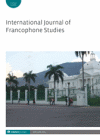
INTERNATIONAL JOURNAL OF FRANCOPHONE STUDIES
Scope & Guideline
Advancing Scholarly Discourse in Francophone Studies
Introduction
Aims and Scopes
- Exploration of Francophone Literature:
The journal publishes articles that critically examine literary works from various Francophone regions, providing insights into their thematic concerns, narrative techniques, and cultural significance. - Interdisciplinary Approaches:
Utilizing methodologies from cultural studies, postcolonial theory, gender studies, and migration studies, the journal encourages interdisciplinary research that broadens the understanding of Francophone texts and contexts. - Focus on Identity and Representation:
Papers often address issues of identity, including gender, race, and postcoloniality, analyzing how these factors are represented in Francophone literature and how they shape cultural narratives. - Engagement with Sociopolitical Themes:
The journal emphasizes the importance of sociopolitical contexts in shaping literary production, often exploring themes such as migration, trauma, and historical memory within Francophone narratives. - Multilingualism and Cultural Hybridity:
Acknowledging the multilingual nature of Francophone communities, the journal examines how language plays a role in identity formation and cultural expression, often highlighting the complexities of linguistic diversity.
Trending and Emerging
- Migration and Identity:
A growing focus on migration narratives and their impact on identity formation is evident, reflecting global trends and the significance of mobility in contemporary Francophone literature. - Gender and Feminist Perspectives:
Recent articles increasingly address gender issues and feminist perspectives, particularly in the context of African feminism and gender inequality, highlighting the contributions of women writers and theorists. - Postmemory and Trauma Studies:
There is an emerging trend towards exploring concepts of postmemory and trauma, particularly in relation to historical events like the Algerian war, as scholars seek to understand how these experiences resonate in contemporary literature. - Cultural Hybridity and Multilingualism:
The journal is seeing a rise in discussions around cultural hybridity and the role of multilingualism in Francophone identity, emphasizing how these elements influence literary expression and community dynamics. - Decolonization of Literature and Critique:
An increasing number of papers are focused on decolonizing literary criticism and exploring how Francophone literature can challenge colonial legacies, reflecting a broader movement within academia towards critical engagement with colonial histories.
Declining or Waning
- Traditional Colonial Narratives:
There has been a noticeable decrease in publications focusing solely on traditional colonial narratives, as the journal shifts towards more contemporary issues and postcolonial critiques that address the complexities of identity and representation in modern contexts. - Historical Accounts of Francophone Regions:
Research centered on strictly historical accounts, such as the history of immigration or colonialism without a contemporary lens, appears to be declining, suggesting a move towards analyses that connect historical contexts to current sociopolitical realities. - Literary Canonical Works:
Interest in canonical Francophone literature, while still present, has waned in favor of more diverse and inclusive explorations of lesser-known voices and marginalized narratives within Francophone studies.
Similar Journals
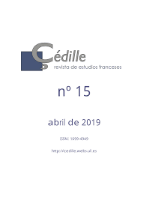
Cedille-Revista de Estudios Franceses
Connecting Scholars in the Heart of French StudiesCedille-Revista de Estudios Franceses is a prominent academic journal published by the ASOC PROFESORES FRANCES UNIV ESPANOLA-APFUE and has established itself as a vital resource in the fields of Linguistics and Language and Literature and Literary Theory. Since its inception in 2005, this Open Access journal has provided a platform for rigorous scholarly articles and critical studies focused on French studies, fostering both research and discussion among academics from around the globe. Originating from Santa Cruz de Tenerife, Spain, Cedille has garnered a respectable impact factor and ranks in the second quartile for Linguistics and Language and the first quartile for Literature and Literary Theory in 2023. With converged years from 2009 to 2024, the journal aims to advance understanding and appreciation of French literature and its linguistic intricacies, serving as a vital forum for researchers, professionals, and students committed to the exploration of French culture and language studies.
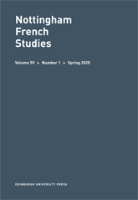
NOTTINGHAM FRENCH STUDIES
Bridging Disciplines, Enriching UnderstandingNOTTINGHAM FRENCH STUDIES is a distinguished academic journal published by Edinburgh University Press, focusing on the diverse realms of French language, literature, culture, and history. With its ISSN 0029-4586 and E-ISSN 2047-7236, the journal serves as a vital platform for scholarly discourse, featuring interdisciplinary research that bridges gaps between Cultural Studies, Linguistics, and Literary Theory. Notable for its robust performance, it holds a Q3 ranking in Cultural Studies and Linguistics and a Q2 ranking in Literature and Literary Theory as of 2023, placing it among the key publications within its field. Throughout its publication span from 1996 to 2024, NOTTINGHAM FRENCH STUDIES has consistently catered to the academic community with insightful articles, enriching the understanding of French cultural contexts. While it is not an Open Access journal, its contributions are pivotal in advancing scholarly dialogue and fostering critical perspectives, making it an essential resource for researchers, professionals, and students engaged in French studies and its interdisciplinary connections.

Anclajes
Connecting Cultures Through Scholarly InsightAnclajes is a prominent academic journal dedicated to the fields of Cultural Studies, Linguistics, and Literature, published by the UNIV NACIONAL LA PAMPA, FAC CIENCIAS HUMANAS. With both print (ISSN 0329-3807) and electronic (E-ISSN 1851-4669) formats, the journal has embraced an Open Access model since 2010, greatly enhancing its accessibility and reach to a global audience. Based in Argentina, Anclajes provides a platform for innovative research and critical discourse, contributing significantly to the understanding of cultural phenomena and literary theories. In recent years, the journal has established itself with a Scopus rank placing it in the top 30% of Literature and Literary Theory and the top 57% of Cultural Studies, as indicated by its quartile rankings for 2023. With issues converging from 2012 to 2024, Anclajes continues to foster scholarly communication and serves as an essential resource for researchers, students, and professionals seeking to explore the dynamism of human culture and expression.
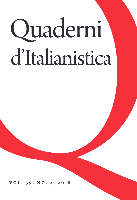
QUADERNI D ITALIANISTICA
Nurturing Academic Excellence in Italian StudiesQUADERNI D ITALIANISTICA is a distinguished journal dedicated to the field of Italian Studies, focusing on literature and literary theory. Published by QUADERNI D ITALIANISTICA and based in Canada, this journal serves as a platform for scholars, researchers, and students alike to engage with critical analyses and scholarly contributions related to Italian literature. Although it has a Q4 ranking in the 2023 category of Literature and Literary Theory and a Scopus rank of #655 out of 982, the journal plays a pivotal role in fostering discourse within this niche. Since its inception in 2002, the journal has contributed significantly to the study of Italian literature, providing a valuable resource for those looking to explore thematic, historical, and narrative aspects of Italian texts. While access to the journal is not offered freely, its comprehensive coverage until 2018 and again in 2020-2021 ensures a rich archive for critical research endeavors. As such, QUADERNI D ITALIANISTICA remains an essential resource for anyone invested in the intricate landscapes of Italian cultural and literary studies.
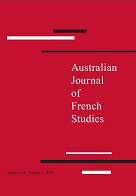
AUSTRALIAN JOURNAL OF FRENCH STUDIES
Connecting Scholars Through the Lens of French HeritageAustralian Journal of French Studies, published by Liverpool University Press, serves as a premier academic platform dedicated to the exploration and dissemination of research in French studies. With a robust history dating back to 1975, this journal focuses on a diverse array of subjects including cultural studies, history, linguistics, and literature, evident from its competitive Q2 and Q3 rankings across various categories in the 2023 quartiles. Although currently not open access, it prides itself on maintaining high scholarly standards, as reflected in its Scopus rankings across multiple disciplines. Through the evaluation of a broad spectrum of interdisciplinary works, the journal aims to foster a deeper understanding of French language and culture among researchers, professionals, and students alike. As it continues to publish valuable insights and foster academic dialogue, the Australian Journal of French Studies remains an essential resource for those interested in the nuances of the Francophone world.
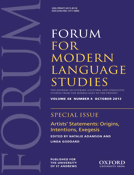
FORUM FOR MODERN LANGUAGE STUDIES
Exploring the Depths of Modern Linguistic ThoughtFORUM FOR MODERN LANGUAGE STUDIES is a prestigious academic journal published by Oxford University Press that has been serving the fields of literature and linguistics since its inception in 1965. This journal, with an ISSN of 0015-8518 and an E-ISSN of 1471-6860, plays a crucial role in advancing scholarly discourse on modern language studies, including literature and literary theory. With an impactful presence in both the linguistic and literary domains, it has been recognized in 2023 with a category ranking of Q2 in Literature and Literary Theory and Q3 in Linguistics and Language. It stands out in the competitive landscape, holding a notable position within Scopus rankings, including a 70th percentile ranking in Literature & Literary Theory. While the journal currently does not offer open access options, it remains a vital resource for researchers, educators, and students passionate about the transformative power of language and literature. Its commitment to quality research and robust academic discussion underscores its importance, making it a key platform for those aiming to contribute to modern language scholarship.

Revue Italienne d'Etudes Francaises
Advancing Critical Discourse in Francophone ScholarshipRevue Italienne d'Etudes Francaises, published by SEMINARIO FILOLOGIA FRANCESE, is a pivotal open access journal dedicated to the exploration and analysis of French studies within the broader context of history, linguistics, and literary theory. Since its inception in 2011, this journal has fostered scholarly dialogue and critical discourse, offering a platform for researchers, professionals, and students alike to disseminate their work and engage with contemporary issues in these fields. With an ISSN and E-ISSN of 2240-7456, the journal has established itself within the academic community, although it currently ranks in the lower quartiles across various disciplines, as indicated by its Scopus metrics. Nevertheless, the Revue Italienne d'Etudes Francaises remains an essential resource for those seeking to deepen their understanding of Francophone literature, culture, and linguistic dynamics from its base in Rome, Italy, at C/O Fondazione Primoli. As the field of French studies continues to evolve, this journal plays an important role in highlighting the latest research findings and theoretical advancements.
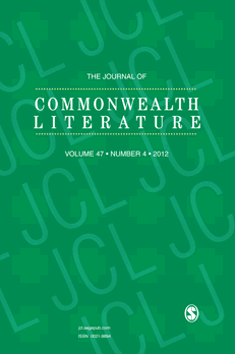
JOURNAL OF COMMONWEALTH LITERATURE
Charting New Territories in Literary ScholarshipJOURNAL OF COMMONWEALTH LITERATURE, published by SAGE Publications Ltd, serves as a premier platform for scholarly discourse in the field of Literature and Literary Theory. Established in 1966, this esteemed journal has built a robust reputation, as evidenced by its impressive Q1 ranking in the 2023 category of Literature and Literary Theory and its placement in the impressive 91st percentile among its peers in the Scopus rankings. With an ISSN of 0021-9894 and an E-ISSN of 1741-6442, the journal provides valuable insights into the rich tapestry of Commonwealth literature, exploring diverse works and critical theories that shape our understanding of literature outside the conventional Western canon. While currently not designated as an Open Access journal, it continues to attract a global readership seeking to advance knowledge in this vital area of scholarship. Researchers, professionals, and students alike will find in its pages a rich resource for innovative ideas and critical discussions that reflect the evolving landscape of literary studies.
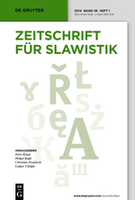
ZEITSCHRIFT FUR SLAWISTIK
Advancing Scholarship in Slavic Studies Since 1956ZEITSCHRIFT FUR SLAWISTIK, published by WALTER DE GRUYTER GMBH, is a renowned journal focusing on Slavic studies, encompassing various fields such as cultural studies, linguistics, and literary theory. With its ISSN 0044-3506, this distinguished journal has been a significant contribution to the academic community since its inception in 1956, continuing to disseminate valuable research until 2024. While maintaining a strong reputation within several academic categories, ZEITSCHRIFT FUR SLAWISTIK holds a Q3 ranking in Cultural Studies and Linguistics and Language, and a Q2 ranking in Literature and Literary Theory as of 2023. This positioning underscores the journal’s impact, particularly as it caters to an audience of researchers, professionals, and students invested in the rich tapestry of Slavic culture and language. Access to this journal is not open; however, its comprehensive articles are crucial for anyone aiming to explore and deepen their understanding of Slavic linguistic and literary traditions. The journal's work is essential in fostering cross-disciplinary dialogue and advancing scholarship in these vital areas.
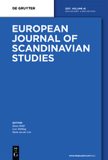
European Journal of Scandinavian Studies
Advancing the frontiers of Scandinavian scholarship.European Journal of Scandinavian Studies is an esteemed journal published by Walter de Gruyter GmbH, dedicated to advancing scholarship in the fields of Cultural Studies, Linguistics and Language, and Literature and Literary Theory. Since its inception in 2010, the journal has been a pivotal platform for researchers and scholars, showcasing cutting-edge research and critical discussions pertaining to Scandinavian languages and cultures. With an ISSN of 2191-9399 and an E-ISSN of 2191-9402, the journal emphasizes accessibility to impactful academic work, despite its current non-open access model. While the journal is categorized within the Q4 quartile for Cultural Studies and Linguistics/Language, it has shown notable potential in ranking higher in its specialized domains, fostering a growing community of researchers invested in Scandinavian studies. The journal's office is located in Berlin, Germany, further enriching its European scholarly context. As it continues to evolve, the European Journal of Scandinavian Studies serves as a vital resource for academics seeking to engage deeply with the multifaceted aspects of Scandinavian culture and linguistics.